- 0706 508 8667
- [email protected]
- Plot 497 Martin Ezeifeoma Street, New GRA Trans-Ekulu, Enugu
We provide education that nurtures curiosity, builds strong values, and prepares every child for a bright future.
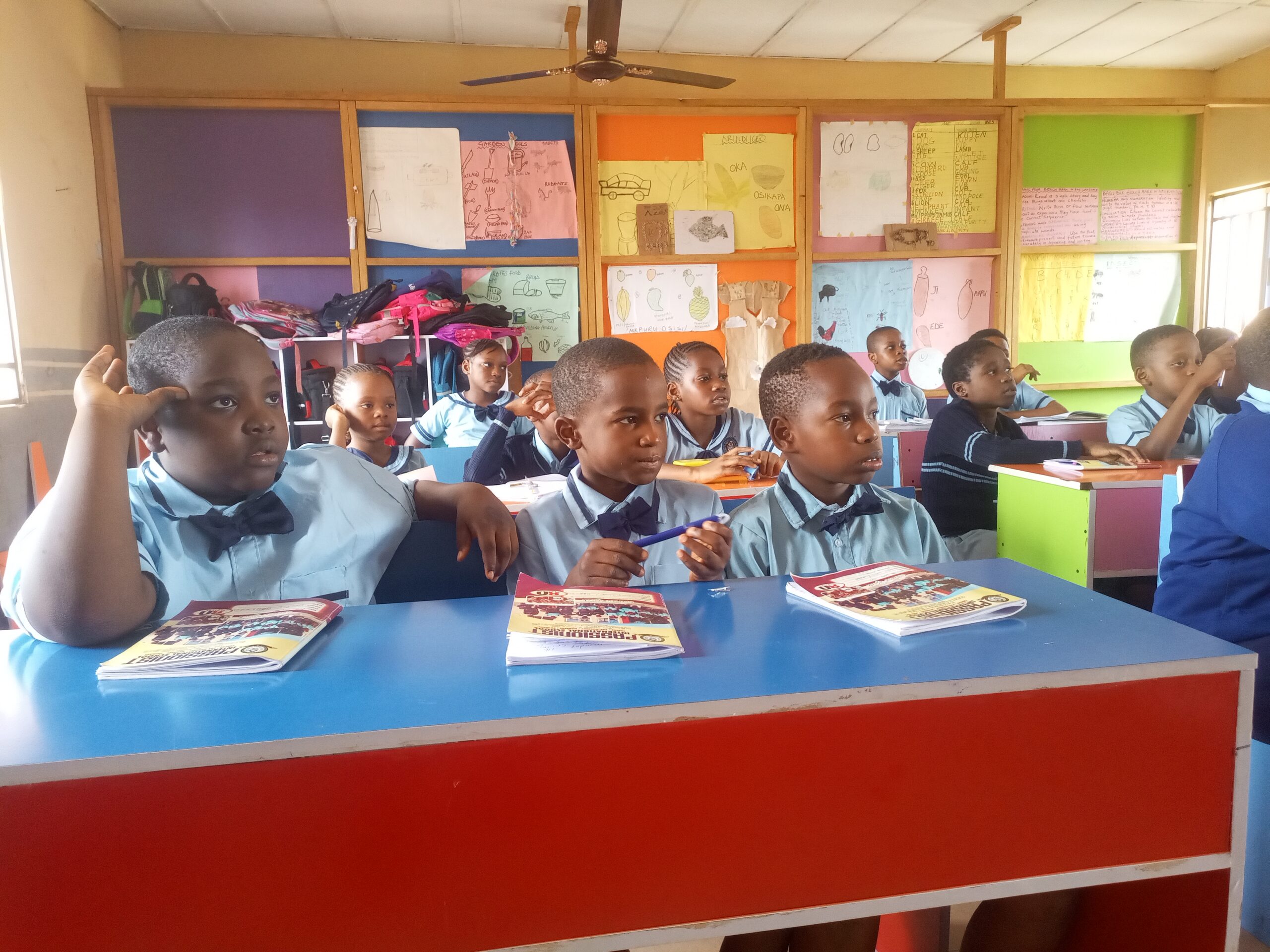
Academics at Passionist is characterized and driven by our believe in nurturing young minds through a holistic, value-driven, and technology-enhanced learning experience.
Our academic programs are built on a strong foundation of excellence, creativity, discipline, and character formation, ensuring that every child grows intellectually, socially, and morally.
Embracing the future of education, we have digitized our academic processes to make learning seamless and engaging. From interactive smart classrooms to online assessments and digital progress tracking, our technology-driven approach ensures that students receive a modern, efficient, and personalized education.
At Passionist, we don’t just teach—we inspire a lifelong love for learning!
At Passionist International School, we are committed to inculcating knowledge, excellence, and virtue in every child, using a child-centered and interactive approach to teaching. Our teaching methods go beyond textbooks—we create an engaging, relevant, hands-on learning experience that nurtures curiosity, creativity, and critical thinking.
Through interactive lessons, group discussions, storytelling, and practical experiments, we ensure that students not only understand concepts but also apply them in real life. Excellence is at the heart of our education, as we encourage pupils to strive for academic success while developing strong moral values and character.
In today’s digital world, we equip our students with essential IT and digital skills, integrating technology into learning to prepare them for the future. From early exposure to computer basics and coding to interactive digital tools, our pupils gain the confidence and skills needed to thrive in a technology-driven world.
We believe that learning is about progress, not just scores. That’s why our assessment system goes beyond traditional exams—we use a mix of class participation, hands-on projects, creative assignments, and teacher observations to track every child’s unique learning journey.
Instead of focusing only on tests, we assess how well students understand concepts, think critically, and apply their knowledge in real-life situations. Our continuous evaluation approach helps us identify each child’s strengths while providing extra support where needed.
Parents are an essential part of this process! We provide regular updates through report cards, teacher feedback, and parent-teacher meetings, so you’ll always know how your little one is growing academically and personally.
Because at Passionist, every step forward is a success worth celebrating!
At Passionist International School, we are committed to inculcating knowledge, excellence, and virtue in every child, using a child-centered and interactive approach to teaching. Our teaching methods go beyond textbooks—we create an engaging, relevant, hands-on learning experience that nurtures curiosity, creativity, and critical thinking.
Through interactive lessons, group discussions, storytelling, and practical experiments, we ensure that students not only understand concepts but also apply them in real life. Excellence is at the heart of our education, as we encourage pupils to strive for academic success while developing strong moral values and character.
In today’s digital world, we equip our students with essential IT and digital skills, integrating technology into learning to prepare them for the future. From early exposure to computer basics and coding to interactive digital tools, our pupils gain the confidence and skills needed to thrive in a technology-driven world.
We believe that learning is about progress, not just scores. That’s why our assessment system goes beyond traditional exams—we use a mix of class participation, hands-on projects, creative assignments, and teacher observations to track every child’s unique learning journey.
Instead of focusing only on tests, we assess how well students understand concepts, think critically, and apply their knowledge in real-life situations. Our continuous evaluation approach helps us identify each child’s strengths while providing extra support where needed.
Parents are an essential part of this process! We provide regular updates through report cards, teacher feedback, and parent-teacher meetings, so you’ll always know how your little one is growing academically and personally.
Because at Passionist, every step forward is a success worth celebrating!
A warm and caring space where infants and toddlers are nurtured and gently introduced to sounds, colors, and movement through play and guided activities.
The nursery stage prepares children for formal schooling through exploratory and sensory-based learning. The curriculum emphasizes language development, number awareness, moral values, social skills, hygiene habits, and creativity.
Objective: To develop early speaking, listening, reading, and writing skills.
Focus Areas:
Alphabet recognition and letter sounds
Picture reading and storytelling
Simple sentence construction
Tracing and early writing practice
Learning Outcomes:
Recognize and name letters of the alphabet
Use simple words and sentences in communication
Trace and write letters correctly
Objective: To introduce basic number concepts and shapes in fun and engaging ways.
Focus Areas:
Number identification and counting (1–20 or more)
Basic shapes and patterns
Sorting and matching activities
Concepts of more/less, big/small
Learning Outcomes:
Count objects and numbers correctly
Identify common shapes and compare sizes
Solve simple matching and sorting tasks
Objective: To introduce children to their native language and cultural identity.
Focus Areas:
Igbo alphabets and greetings
Common objects and animals in Igbo
Songs, rhymes, and simple conversations
Learning Outcomes:
Say common greetings and words in Igbo
Identify Igbo letters and pronounce them
Sing short Igbo songs
Objective: To awaken curiosity about the environment and natural world.
Focus Areas:
Living and non-living things
Identifying animals and plants
Weather and seasons
Exploring water, air, and soil through play
Learning Outcomes:
Name animals, body parts, and plants
Observe and describe natural things
Ask questions about the world around them
Objective: To instill love for God, good behavior, and spiritual development.
Focus Areas:
Bible stories (e.g., creation, Noah, baby Jesus)
Christian songs and prayers
Moral lessons like obedience, sharing, kindness
Learning Outcomes:
Retell short Bible stories
Sing Christian songs and say simple prayers
Demonstrate basic Christian virtues
Objective: To build language rhythm, memory, and phonemic awareness.
Focus Areas:
Nursery rhymes and poems
Clapping and action songs
Rhyming word games
Learning Outcomes:
Recite nursery rhymes with actions
Recognize rhyming sounds
Participate in rhythm and sound play
Objective: To teach children healthy routines and personal hygiene.
Focus Areas:
Brushing, bathing, and washing hands
Eating healthy foods
Keeping clothes and surroundings clean
Rest and exercise
Learning Outcomes:
Practice daily hygiene routines
Identify healthy and unhealthy foods
Demonstrate neatness and cleanliness
Objective: To introduce basic digital awareness and familiarization with technology.
Focus Areas:
What is a computer?
Parts of a computer (mouse, monitor, keyboard)
Safe handling of digital devices
Basic mouse movement and typing games
Learning Outcomes:
Identify basic parts of a computer
Use mouse and keyboard with guidance
Watch and learn from educational software
Objective: To build social skills and awareness of home, school, and community.
Focus Areas:
Good manners (please, thank you, sorry)
Greeting and respect for others
Role of family and school members
Taking turns and sharing
Learning Outcomes:
Demonstrate politeness and respect
Interact positively with peers and adults
Understand basic roles at home and school
Objective: To develop foundational sound recognition and reading readiness.
Focus Areas:
Letter sounds (A–Z)
Beginning sounds and blending
Simple CVC words (e.g., cat, dog, pen)
Sound-symbol correspondence
Learning Outcomes:
Identify and pronounce letter sounds
Blend simple sounds into words
Recognize the sounds in familiar words
Children explore early learning through songs, rhymes, storytelling, and group play. Focus is on building foundational skills in fun and supportive ways.
The nursery stage prepares children for formal schooling through exploratory and sensory-based learning. The curriculum emphasizes language development, number awareness, moral values, social skills, hygiene habits, and creativity.
Objective: To develop early speaking, listening, reading, and writing skills.
Focus Areas:
Alphabet recognition and letter sounds
Picture reading and storytelling
Simple sentence construction
Tracing and early writing practice
Learning Outcomes:
Recognize and name letters of the alphabet
Use simple words and sentences in communication
Trace and write letters correctly
Objective: To introduce basic number concepts and shapes in fun and engaging ways.
Focus Areas:
Number identification and counting (1–20 or more)
Basic shapes and patterns
Sorting and matching activities
Concepts of more/less, big/small
Learning Outcomes:
Count objects and numbers correctly
Identify common shapes and compare sizes
Solve simple matching and sorting tasks
Objective: To introduce children to their native language and cultural identity.
Focus Areas:
Igbo alphabets and greetings
Common objects and animals in Igbo
Songs, rhymes, and simple conversations
Learning Outcomes:
Say common greetings and words in Igbo
Identify Igbo letters and pronounce them
Sing short Igbo songs
Objective: To awaken curiosity about the environment and natural world.
Focus Areas:
Living and non-living things
Identifying animals and plants
Weather and seasons
Exploring water, air, and soil through play
Learning Outcomes:
Name animals, body parts, and plants
Observe and describe natural things
Ask questions about the world around them
Objective: To instill love for God, good behavior, and spiritual development.
Focus Areas:
Bible stories (e.g., creation, Noah, baby Jesus)
Christian songs and prayers
Moral lessons like obedience, sharing, kindness
Learning Outcomes:
Retell short Bible stories
Sing Christian songs and say simple prayers
Demonstrate basic Christian virtues
Objective: To build language rhythm, memory, and phonemic awareness.
Focus Areas:
Nursery rhymes and poems
Clapping and action songs
Rhyming word games
Learning Outcomes:
Recite nursery rhymes with actions
Recognize rhyming sounds
Participate in rhythm and sound play
Objective: To teach children healthy routines and personal hygiene.
Focus Areas:
Brushing, bathing, and washing hands
Eating healthy foods
Keeping clothes and surroundings clean
Rest and exercise
Learning Outcomes:
Practice daily hygiene routines
Identify healthy and unhealthy foods
Demonstrate neatness and cleanliness
Objective: To introduce basic digital awareness and familiarization with technology.
Focus Areas:
What is a computer?
Parts of a computer (mouse, monitor, keyboard)
Safe handling of digital devices
Basic mouse movement and typing games
Learning Outcomes:
Identify basic parts of a computer
Use mouse and keyboard with guidance
Watch and learn from educational software
Objective: To build social skills and awareness of home, school, and community.
Focus Areas:
Good manners (please, thank you, sorry)
Greeting and respect for others
Role of family and school members
Taking turns and sharing
Learning Outcomes:
Demonstrate politeness and respect
Interact positively with peers and adults
Understand basic roles at home and school
Objective: To develop foundational sound recognition and reading readiness.
Focus Areas:
Letter sounds (A–Z)
Beginning sounds and blending
Simple CVC words (e.g., cat, dog, pen)
Sound-symbol correspondence
Learning Outcomes:
Identify and pronounce letter sounds
Blend simple sounds into words
Recognize the sounds in familiar words
Learners develop reading, writing, and numeracy skills. Key subjects include English, Math, Science, Arts, ICT, and local languages taught through engaging methods.
At the Lower Basic level, the focus is on developing early literacy, numeracy, observation skills, creativity, and moral values. Teaching is done in an engaging, activity-based, and inclusive manner that ensures pupils build confidence and curiosity.
Objective: To build strong reading, writing, speaking, and listening skills.
Focus Areas:
Phonics and pronunciation
Reading fluency and comprehension
Basic grammar and sentence formation
Spelling and simple writing
Speaking in simple English
Learning Outcomes:
Read short texts independently
Write simple sentences and short stories
Communicate clearly using age-appropriate vocabulary
Objective: To develop foundational numeracy and problem-solving skills.
Focus Areas:
Counting and number recognition
Addition, subtraction, multiplication, and division
Shapes, patterns, and measurements
Time, money, and simple graphs
Learning Outcomes:
Perform basic operations accurately
Recognize and describe shapes and patterns
Solve simple real-life mathematical problems
Objective: To introduce the mother tongue and cultural identity in communication.
Focus Areas:
Igbo alphabets and word building
Greetings and self-introduction
Simple sentences and conversation
Igbo songs, folktales, and rhymes
Learning Outcomes:
Identify Igbo letters and sounds
Engage in basic Igbo dialogue
Appreciate Igbo language and heritage
Objective: To introduce pupils to simple French words and phrases in a fun and interactive way.
Focus Areas:
Alphabets and numbers in French
Days, months, and colours
Greetings and classroom expressions
Simple songs and rhymes
Learning Outcomes:
Respond to basic French greetings
Identify common French vocabulary
Sing short French songs with actions
Objective: To build curiosity about nature, the environment, and how things work.
Focus Areas:
Living and non-living things
The human body and health habits
Weather, air, water, and soil
Simple tools and machines
Learning Outcomes:
Identify and describe common plants, animals, and body parts
Demonstrate proper hygiene and safety habits
Observe and talk about natural occurrences
Objective: To teach good morals, civic responsibility, and respect for national identity.
Focus Areas:
Honesty, kindness, respect, and obedience
National symbols and heroes
Community helpers and roles
Basic rights and duties
Learning Outcomes:
Demonstrate good behavior at home and school
Recognize national flags, anthem, and symbols
Show appreciation for community and national values
Objective: To introduce pupils to simple life and practical skills.
Focus Areas:
Planting seeds and caring for animals
Drawing, coloring, and modeling
Sweeping, folding, and tidiness
Identifying household and farm tools
Learning Outcomes:
Participate in simple gardening or cleaning tasks
Use hands to create basic crafts
Identify the uses of common tools and materials
Objective: To explore self-expression and cultural identity through art and activities.
Focus Areas:
Drawing and coloring with different materials
Paper folding, clay molding, and painting
Traditional stories and songs
Cultural dress and festival appreciation
Learning Outcomes:
Create simple art projects using local materials
Participate in dance, drama, or song
Appreciate Nigerian cultures and traditions
Objective: To introduce pupils to the basics of computers and digital literacy.
Focus Areas:
Parts of a computer and their functions
How to start and shut down a computer
Introduction to keyboard and mouse use
Drawing and typing with basic software
Learning Outcomes:
Identify basic computer parts
Use the mouse and keyboard to complete simple tasks
Recognize the importance of computers in daily life
Objective: To enhance thinking, logic, and language structure skills.
Focus Areas:
Number and shape patterns
Sequences and analogies
Word associations and opposites
Picture and code reasoning
Learning Outcomes:
Solve puzzles involving numbers and patterns
Think critically and make logical connections
Improve language structure and vocabulary
Objective: To develop rhythm, listening, and creative musical expression.
Focus Areas:
Singing nursery rhymes and folk songs
Basic rhythm clapping and percussion
Musical instruments recognition
Music and movement games
Learning Outcomes:
Sing in tune and rhythm
Keep time with beats using body or instruments
Identify different sounds and instruments
Learners explore more advanced topics across a broad range of subjects. Emphasis is placed on creativity, independence, and strong academic grounding.
The curriculum for Basic 4 to 6 builds on foundational learning in the upper primary levels. At this stage, learners are exposed to broader knowledge, critical thinking, creativity, and moral development. Each subject is structured to develop pupils cognitively, emotionally, physically, and socially.
Objective: To enhance pupils’ ability to read, write, speak, and listen effectively.
Focus Areas:
Grammar and sentence construction
Reading comprehension
Creative and essay writing
Vocabulary development
Speaking and listening exercises
Learning Outcomes:
Write correct and coherent sentences and paragraphs
Comprehend grade-level passages
Communicate clearly in oral and written English
Objective: To develop numerical literacy and logical reasoning.
Focus Areas:
Number and numeration
Basic operations (addition, subtraction, multiplication, division)
Fractions, decimals, and percentages
Geometry and measurement
Word problems and data handling
Learning Outcomes:
Apply mathematical concepts in everyday situations
Solve problems involving operations and measurements
Interpret charts and simple data
Objective: To promote the understanding and use of the Igbo language in communication and cultural expression.
Focus Areas:
Vocabulary and sentence formation
Reading and writing in Igbo
Proverbs, folktales, and cultural expressions
Learning Outcomes:
Converse in simple Igbo
Read and write basic texts in Igbo
Appreciate Igbo culture and traditions
Objective: To introduce pupils to basic French for communication and cultural appreciation.
Focus Areas:
Greetings and introductions
Numbers, days, months, colours
Simple phrases and sentence patterns
Songs, rhymes, and short dialogues
Learning Outcomes:
Engage in basic French conversations
Read and write simple French phrases
Demonstrate awareness of French culture
Objective: To develop awareness of local and global history and geography.
Focus Areas:
Nigerian history and heroes
Early civilizations and independence
Physical features and regions of Nigeria
Continents, oceans, and world map reading
Learning Outcomes:
Identify key events in Nigerian and world history
Describe geographical features of Nigeria and other places
Understand the role of history in nation-building
Objective: To build scientific knowledge and curiosity about the physical and natural world.
Focus Areas:
Living and non-living things
The human body and health
Energy, force, and motion
Materials and simple machines
Introduction to coding and robotics
Learning Outcomes:
Conduct basic scientific observations and experiments
Understand simple technological processes
Apply scientific knowledge in everyday life
Objective: To promote national consciousness, civic responsibilities, and moral values.
Focus Areas:
Citizenship and civic education
Respect for national symbols and leaders
Moral instruction and decision-making
Peace, unity, and patriotism
Learning Outcomes:
Demonstrate respect for national identity
Show responsible behavior and integrity
Understand rights and responsibilities as citizens
Objective: To introduce pupils to basic vocational and entrepreneurial skills.
Focus Areas:
Agriculture and crop planting
Handcrafts and model making
Home economics and hygiene
Simple business skills (e.g. buying and selling)
Learning Outcomes:
Perform basic farming and craft activities
Exhibit responsibility and entrepreneurship
Appreciate the dignity of labor
Objective: To explore creativity and cultural expression through visual and performing arts.
Focus Areas:
Drawing, painting, and modeling
Traditional and modern dances
Storytelling and dramatization
Cultural heritage and identity
Learning Outcomes:
Create expressive artworks using various media
Participate in drama and dance
Value cultural diversity and art appreciation
Objective: To instill moral integrity and spiritual development.
Focus Areas:
Respect, honesty, and empathy
Religious teachings (Christianity, Islam, or Traditional religion)
Religious festivals and practices
Prayers, songs, and stories
Learning Outcomes:
Practice moral virtues and religious values
Respect different beliefs and practices
Make morally sound choices
Objective: To equip pupils with digital literacy and computing skills.
Focus Areas:
Introduction to computers and their parts
Basic typing and word processing
Internet safety and research skills
Coding with block-based programs
Learning Outcomes:
Operate basic computer functions
Use educational software and the internet responsibly
Develop foundational coding skills
Objective: To improve correct pronunciation, phonics, and oral fluency.
Focus Areas:
English phonemes and pronunciation drills
Syllabic stress and intonation
Phonetic transcription basics
Recitations and public speaking
Learning Outcomes:
Speak English with clarity and confidence
Identify and produce correct speech sounds
Develop presentation and elocution skills
Objective: To develop appreciation for music and musical creativity.
Focus Areas:
Singing and rhythm exercises
Introduction to musical instruments
Music notation and solfa
Folk and contemporary music
Learning Outcomes:
Perform simple songs and rhythms
Identify common instruments
Compose and interpret simple music notations
A warm and caring space where infants and toddlers are nurtured and gently introduced to sounds, colors, and movement through play and guided activities.
The nursery stage prepares children for formal schooling through exploratory and sensory-based learning. The curriculum emphasizes language development, number awareness, moral values, social skills, hygiene habits, and creativity.
Objective: To develop early speaking, listening, reading, and writing skills.
Focus Areas:
Alphabet recognition and letter sounds
Picture reading and storytelling
Simple sentence construction
Tracing and early writing practice
Learning Outcomes:
Recognize and name letters of the alphabet
Use simple words and sentences in communication
Trace and write letters correctly
Objective: To introduce basic number concepts and shapes in fun and engaging ways.
Focus Areas:
Number identification and counting (1–20 or more)
Basic shapes and patterns
Sorting and matching activities
Concepts of more/less, big/small
Learning Outcomes:
Count objects and numbers correctly
Identify common shapes and compare sizes
Solve simple matching and sorting tasks
Objective: To introduce children to their native language and cultural identity.
Focus Areas:
Igbo alphabets and greetings
Common objects and animals in Igbo
Songs, rhymes, and simple conversations
Learning Outcomes:
Say common greetings and words in Igbo
Identify Igbo letters and pronounce them
Sing short Igbo songs
Objective: To awaken curiosity about the environment and natural world.
Focus Areas:
Living and non-living things
Identifying animals and plants
Weather and seasons
Exploring water, air, and soil through play
Learning Outcomes:
Name animals, body parts, and plants
Observe and describe natural things
Ask questions about the world around them
Objective: To instill love for God, good behavior, and spiritual development.
Focus Areas:
Bible stories (e.g., creation, Noah, baby Jesus)
Christian songs and prayers
Moral lessons like obedience, sharing, kindness
Learning Outcomes:
Retell short Bible stories
Sing Christian songs and say simple prayers
Demonstrate basic Christian virtues
Objective: To build language rhythm, memory, and phonemic awareness.
Focus Areas:
Nursery rhymes and poems
Clapping and action songs
Rhyming word games
Learning Outcomes:
Recite nursery rhymes with actions
Recognize rhyming sounds
Participate in rhythm and sound play
Objective: To teach children healthy routines and personal hygiene.
Focus Areas:
Brushing, bathing, and washing hands
Eating healthy foods
Keeping clothes and surroundings clean
Rest and exercise
Learning Outcomes:
Practice daily hygiene routines
Identify healthy and unhealthy foods
Demonstrate neatness and cleanliness
Objective: To introduce basic digital awareness and familiarization with technology.
Focus Areas:
What is a computer?
Parts of a computer (mouse, monitor, keyboard)
Safe handling of digital devices
Basic mouse movement and typing games
Learning Outcomes:
Identify basic parts of a computer
Use mouse and keyboard with guidance
Watch and learn from educational software
Objective: To build social skills and awareness of home, school, and community.
Focus Areas:
Good manners (please, thank you, sorry)
Greeting and respect for others
Role of family and school members
Taking turns and sharing
Learning Outcomes:
Demonstrate politeness and respect
Interact positively with peers and adults
Understand basic roles at home and school
Objective: To develop foundational sound recognition and reading readiness.
Focus Areas:
Letter sounds (A–Z)
Beginning sounds and blending
Simple CVC words (e.g., cat, dog, pen)
Sound-symbol correspondence
Learning Outcomes:
Identify and pronounce letter sounds
Blend simple sounds into words
Recognize the sounds in familiar words
Children explore early learning through songs, rhymes, storytelling, and group play. Focus is on building foundational skills in fun and supportive ways.
The nursery stage prepares children for formal schooling through exploratory and sensory-based learning. The curriculum emphasizes language development, number awareness, moral values, social skills, hygiene habits, and creativity.
Objective: To develop early speaking, listening, reading, and writing skills.
Focus Areas:
Alphabet recognition and letter sounds
Picture reading and storytelling
Simple sentence construction
Tracing and early writing practice
Learning Outcomes:
Recognize and name letters of the alphabet
Use simple words and sentences in communication
Trace and write letters correctly
Objective: To introduce basic number concepts and shapes in fun and engaging ways.
Focus Areas:
Number identification and counting (1–20 or more)
Basic shapes and patterns
Sorting and matching activities
Concepts of more/less, big/small
Learning Outcomes:
Count objects and numbers correctly
Identify common shapes and compare sizes
Solve simple matching and sorting tasks
Objective: To introduce children to their native language and cultural identity.
Focus Areas:
Igbo alphabets and greetings
Common objects and animals in Igbo
Songs, rhymes, and simple conversations
Learning Outcomes:
Say common greetings and words in Igbo
Identify Igbo letters and pronounce them
Sing short Igbo songs
Objective: To awaken curiosity about the environment and natural world.
Focus Areas:
Living and non-living things
Identifying animals and plants
Weather and seasons
Exploring water, air, and soil through play
Learning Outcomes:
Name animals, body parts, and plants
Observe and describe natural things
Ask questions about the world around them
Objective: To instill love for God, good behavior, and spiritual development.
Focus Areas:
Bible stories (e.g., creation, Noah, baby Jesus)
Christian songs and prayers
Moral lessons like obedience, sharing, kindness
Learning Outcomes:
Retell short Bible stories
Sing Christian songs and say simple prayers
Demonstrate basic Christian virtues
Objective: To build language rhythm, memory, and phonemic awareness.
Focus Areas:
Nursery rhymes and poems
Clapping and action songs
Rhyming word games
Learning Outcomes:
Recite nursery rhymes with actions
Recognize rhyming sounds
Participate in rhythm and sound play
Objective: To teach children healthy routines and personal hygiene.
Focus Areas:
Brushing, bathing, and washing hands
Eating healthy foods
Keeping clothes and surroundings clean
Rest and exercise
Learning Outcomes:
Practice daily hygiene routines
Identify healthy and unhealthy foods
Demonstrate neatness and cleanliness
Objective: To introduce basic digital awareness and familiarization with technology.
Focus Areas:
What is a computer?
Parts of a computer (mouse, monitor, keyboard)
Safe handling of digital devices
Basic mouse movement and typing games
Learning Outcomes:
Identify basic parts of a computer
Use mouse and keyboard with guidance
Watch and learn from educational software
Objective: To build social skills and awareness of home, school, and community.
Focus Areas:
Good manners (please, thank you, sorry)
Greeting and respect for others
Role of family and school members
Taking turns and sharing
Learning Outcomes:
Demonstrate politeness and respect
Interact positively with peers and adults
Understand basic roles at home and school
Objective: To develop foundational sound recognition and reading readiness.
Focus Areas:
Letter sounds (A–Z)
Beginning sounds and blending
Simple CVC words (e.g., cat, dog, pen)
Sound-symbol correspondence
Learning Outcomes:
Identify and pronounce letter sounds
Blend simple sounds into words
Recognize the sounds in familiar words
Learners develop reading, writing, and numeracy skills. Key subjects include English, Math, Science, Arts, ICT, and local languages taught through engaging methods.
At the Lower Basic level, the focus is on developing early literacy, numeracy, observation skills, creativity, and moral values. Teaching is done in an engaging, activity-based, and inclusive manner that ensures pupils build confidence and curiosity.
Objective: To build strong reading, writing, speaking, and listening skills.
Focus Areas:
Phonics and pronunciation
Reading fluency and comprehension
Basic grammar and sentence formation
Spelling and simple writing
Speaking in simple English
Learning Outcomes:
Read short texts independently
Write simple sentences and short stories
Communicate clearly using age-appropriate vocabulary
Objective: To develop foundational numeracy and problem-solving skills.
Focus Areas:
Counting and number recognition
Addition, subtraction, multiplication, and division
Shapes, patterns, and measurements
Time, money, and simple graphs
Learning Outcomes:
Perform basic operations accurately
Recognize and describe shapes and patterns
Solve simple real-life mathematical problems
Objective: To introduce the mother tongue and cultural identity in communication.
Focus Areas:
Igbo alphabets and word building
Greetings and self-introduction
Simple sentences and conversation
Igbo songs, folktales, and rhymes
Learning Outcomes:
Identify Igbo letters and sounds
Engage in basic Igbo dialogue
Appreciate Igbo language and heritage
Objective: To introduce pupils to simple French words and phrases in a fun and interactive way.
Focus Areas:
Alphabets and numbers in French
Days, months, and colours
Greetings and classroom expressions
Simple songs and rhymes
Learning Outcomes:
Respond to basic French greetings
Identify common French vocabulary
Sing short French songs with actions
Objective: To build curiosity about nature, the environment, and how things work.
Focus Areas:
Living and non-living things
The human body and health habits
Weather, air, water, and soil
Simple tools and machines
Learning Outcomes:
Identify and describe common plants, animals, and body parts
Demonstrate proper hygiene and safety habits
Observe and talk about natural occurrences
Objective: To teach good morals, civic responsibility, and respect for national identity.
Focus Areas:
Honesty, kindness, respect, and obedience
National symbols and heroes
Community helpers and roles
Basic rights and duties
Learning Outcomes:
Demonstrate good behavior at home and school
Recognize national flags, anthem, and symbols
Show appreciation for community and national values
Objective: To introduce pupils to simple life and practical skills.
Focus Areas:
Planting seeds and caring for animals
Drawing, coloring, and modeling
Sweeping, folding, and tidiness
Identifying household and farm tools
Learning Outcomes:
Participate in simple gardening or cleaning tasks
Use hands to create basic crafts
Identify the uses of common tools and materials
Objective: To explore self-expression and cultural identity through art and activities.
Focus Areas:
Drawing and coloring with different materials
Paper folding, clay molding, and painting
Traditional stories and songs
Cultural dress and festival appreciation
Learning Outcomes:
Create simple art projects using local materials
Participate in dance, drama, or song
Appreciate Nigerian cultures and traditions
Objective: To introduce pupils to the basics of computers and digital literacy.
Focus Areas:
Parts of a computer and their functions
How to start and shut down a computer
Introduction to keyboard and mouse use
Drawing and typing with basic software
Learning Outcomes:
Identify basic computer parts
Use the mouse and keyboard to complete simple tasks
Recognize the importance of computers in daily life
Objective: To enhance thinking, logic, and language structure skills.
Focus Areas:
Number and shape patterns
Sequences and analogies
Word associations and opposites
Picture and code reasoning
Learning Outcomes:
Solve puzzles involving numbers and patterns
Think critically and make logical connections
Improve language structure and vocabulary
Objective: To develop rhythm, listening, and creative musical expression.
Focus Areas:
Singing nursery rhymes and folk songs
Basic rhythm clapping and percussion
Musical instruments recognition
Music and movement games
Learning Outcomes:
Sing in tune and rhythm
Keep time with beats using body or instruments
Identify different sounds and instruments
Learners explore more advanced topics across a broad range of subjects. Emphasis is placed on creativity, independence, and strong academic grounding.
The curriculum for Basic 4 to 6 builds on foundational learning in the upper primary levels. At this stage, learners are exposed to broader knowledge, critical thinking, creativity, and moral development. Each subject is structured to develop pupils cognitively, emotionally, physically, and socially.
Objective: To enhance pupils’ ability to read, write, speak, and listen effectively.
Focus Areas:
Grammar and sentence construction
Reading comprehension
Creative and essay writing
Vocabulary development
Speaking and listening exercises
Learning Outcomes:
Write correct and coherent sentences and paragraphs
Comprehend grade-level passages
Communicate clearly in oral and written English
Objective: To develop numerical literacy and logical reasoning.
Focus Areas:
Number and numeration
Basic operations (addition, subtraction, multiplication, division)
Fractions, decimals, and percentages
Geometry and measurement
Word problems and data handling
Learning Outcomes:
Apply mathematical concepts in everyday situations
Solve problems involving operations and measurements
Interpret charts and simple data
Objective: To promote the understanding and use of the Igbo language in communication and cultural expression.
Focus Areas:
Vocabulary and sentence formation
Reading and writing in Igbo
Proverbs, folktales, and cultural expressions
Learning Outcomes:
Converse in simple Igbo
Read and write basic texts in Igbo
Appreciate Igbo culture and traditions
Objective: To introduce pupils to basic French for communication and cultural appreciation.
Focus Areas:
Greetings and introductions
Numbers, days, months, colours
Simple phrases and sentence patterns
Songs, rhymes, and short dialogues
Learning Outcomes:
Engage in basic French conversations
Read and write simple French phrases
Demonstrate awareness of French culture
Objective: To develop awareness of local and global history and geography.
Focus Areas:
Nigerian history and heroes
Early civilizations and independence
Physical features and regions of Nigeria
Continents, oceans, and world map reading
Learning Outcomes:
Identify key events in Nigerian and world history
Describe geographical features of Nigeria and other places
Understand the role of history in nation-building
Objective: To build scientific knowledge and curiosity about the physical and natural world.
Focus Areas:
Living and non-living things
The human body and health
Energy, force, and motion
Materials and simple machines
Introduction to coding and robotics
Learning Outcomes:
Conduct basic scientific observations and experiments
Understand simple technological processes
Apply scientific knowledge in everyday life
Objective: To promote national consciousness, civic responsibilities, and moral values.
Focus Areas:
Citizenship and civic education
Respect for national symbols and leaders
Moral instruction and decision-making
Peace, unity, and patriotism
Learning Outcomes:
Demonstrate respect for national identity
Show responsible behavior and integrity
Understand rights and responsibilities as citizens
Objective: To introduce pupils to basic vocational and entrepreneurial skills.
Focus Areas:
Agriculture and crop planting
Handcrafts and model making
Home economics and hygiene
Simple business skills (e.g. buying and selling)
Learning Outcomes:
Perform basic farming and craft activities
Exhibit responsibility and entrepreneurship
Appreciate the dignity of labor
Objective: To explore creativity and cultural expression through visual and performing arts.
Focus Areas:
Drawing, painting, and modeling
Traditional and modern dances
Storytelling and dramatization
Cultural heritage and identity
Learning Outcomes:
Create expressive artworks using various media
Participate in drama and dance
Value cultural diversity and art appreciation
Objective: To instill moral integrity and spiritual development.
Focus Areas:
Respect, honesty, and empathy
Religious teachings (Christianity, Islam, or Traditional religion)
Religious festivals and practices
Prayers, songs, and stories
Learning Outcomes:
Practice moral virtues and religious values
Respect different beliefs and practices
Make morally sound choices
Objective: To equip pupils with digital literacy and computing skills.
Focus Areas:
Introduction to computers and their parts
Basic typing and word processing
Internet safety and research skills
Coding with block-based programs
Learning Outcomes:
Operate basic computer functions
Use educational software and the internet responsibly
Develop foundational coding skills
Objective: To improve correct pronunciation, phonics, and oral fluency.
Focus Areas:
English phonemes and pronunciation drills
Syllabic stress and intonation
Phonetic transcription basics
Recitations and public speaking
Learning Outcomes:
Speak English with clarity and confidence
Identify and produce correct speech sounds
Develop presentation and elocution skills
Objective: To develop appreciation for music and musical creativity.
Focus Areas:
Singing and rhythm exercises
Introduction to musical instruments
Music notation and solfa
Folk and contemporary music
Learning Outcomes:
Perform simple songs and rhythms
Identify common instruments
Compose and interpret simple music notations
We believe learning isn’t just about textbooks—it’s about discovering passions! From sports and dance, music and arts to science and tech, there’s always something to explore. Whether on the football field or the debate stage, every child finds their spark here!
Our activities are designed to develop well-rounded students. Students can join a variety of clubs, try out for our sports teams, or participate in exciting field trips that enhance their classroom lessons with real-world experiences.
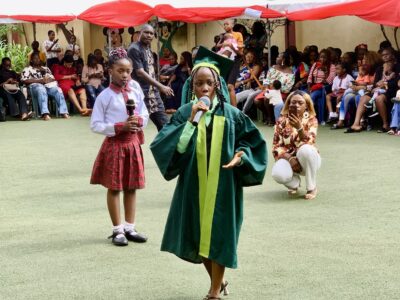
Speak up, think fast, and win arguments! Express ideas boldly through debates, storytelling, and poetry while building confidence and creativity.
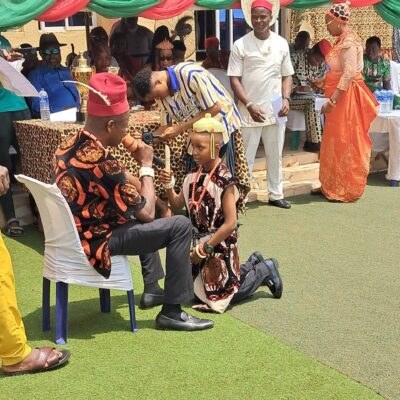
Lights, camera, action! Bring stories to life with acting, cultural displays, and fun performances that boost confidence and teamwork.
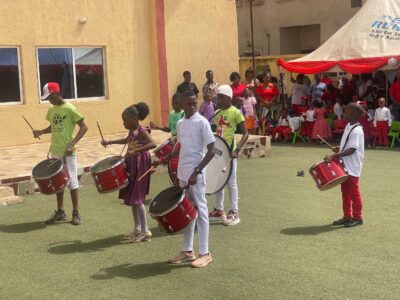
Sing, drum, and dance to the rhythm! Explore music, instruments, and creative movement while having fun and making melodies.
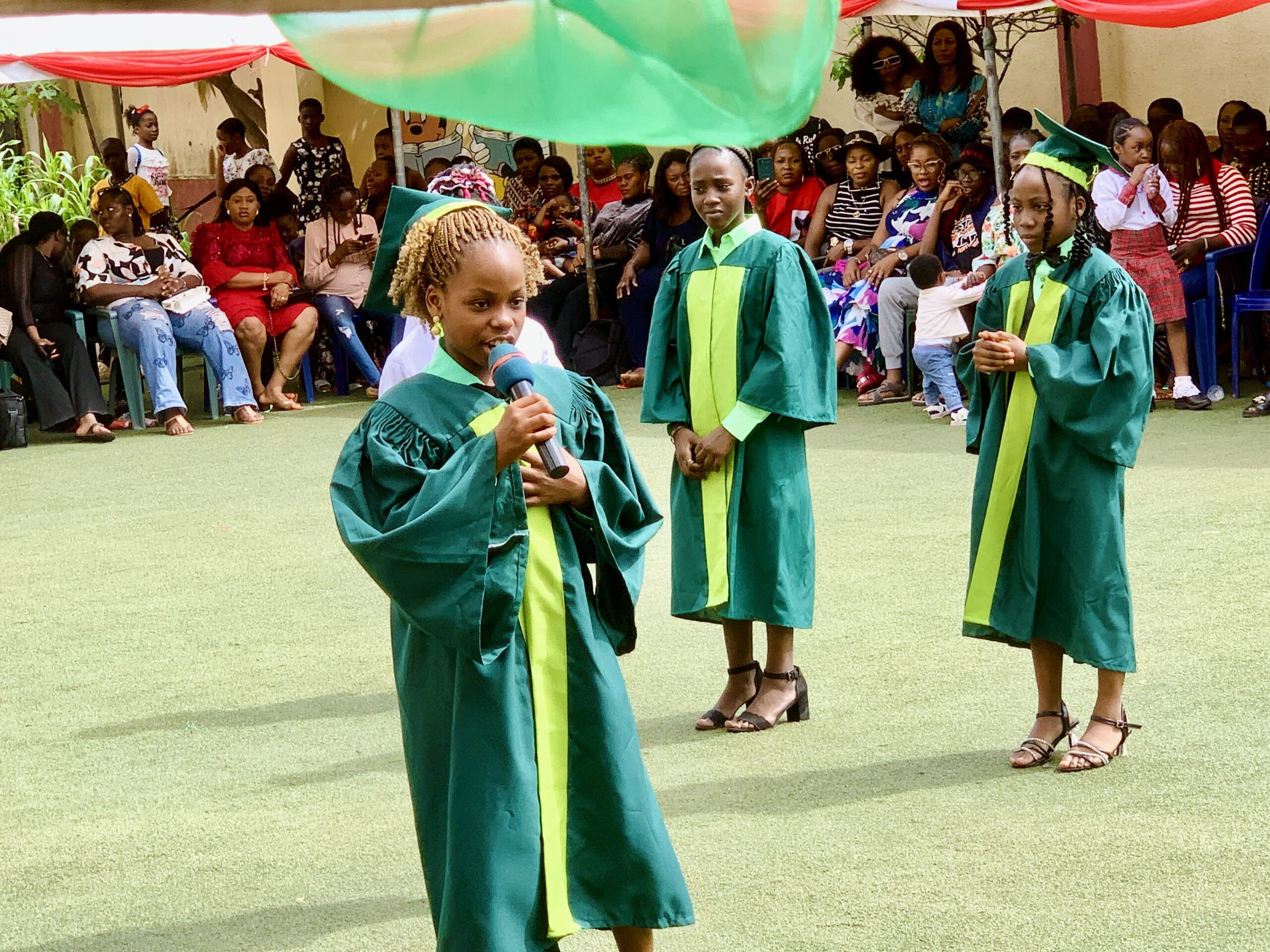
Discover the power of words! Report stories, write articles, and learn journalistic skills while keeping the school informed and inspired.
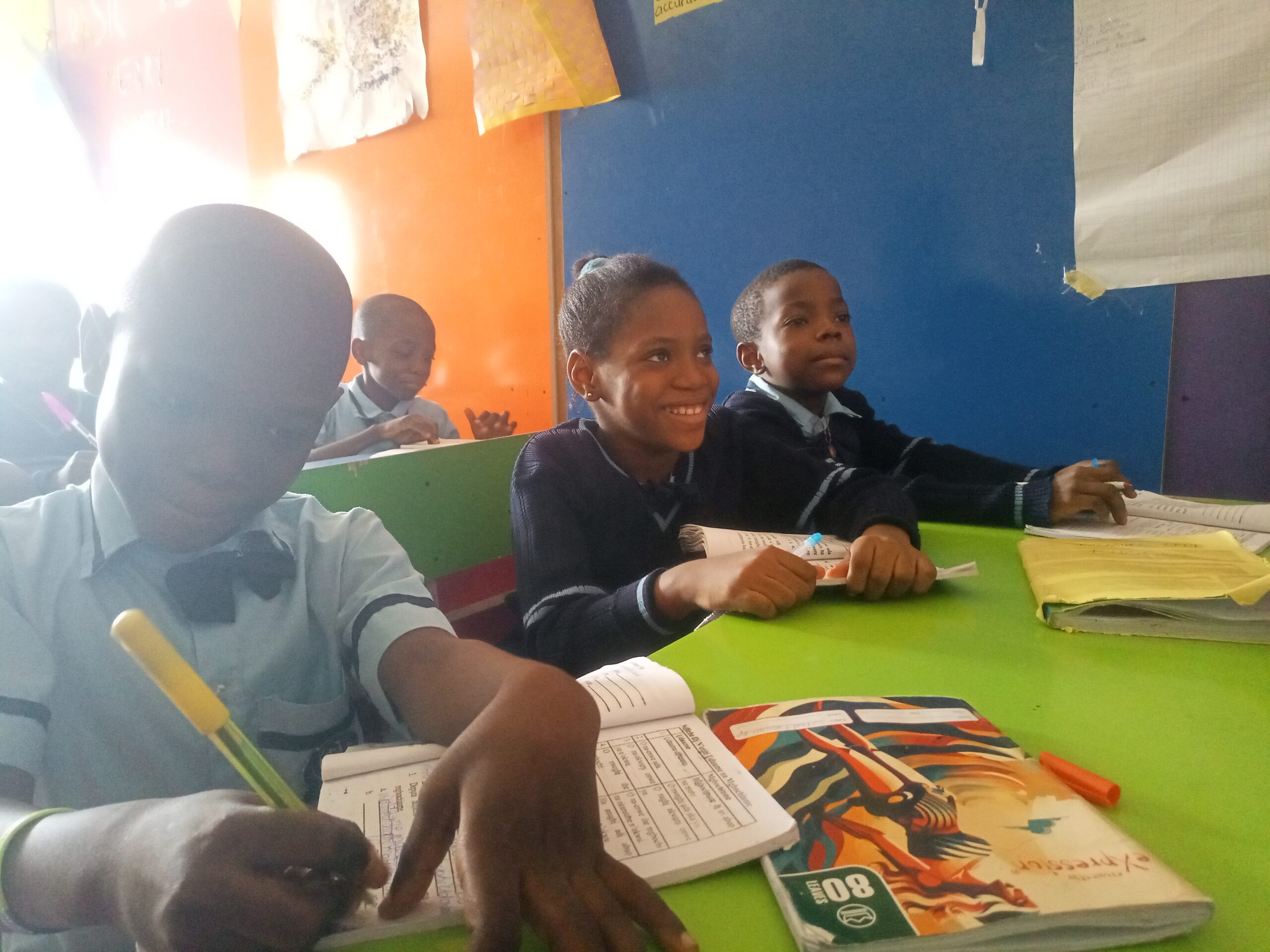
Crack numbers and solve puzzles! Explore math through fun challenges, logic games, and brain-teasing competitions.

Celebrate Igbo language and culture! Engage in storytelling, proverbs, songs, and traditions that connect us to our roots.
Our passionate and experienced teachers are more than just educators—they’re mentors, cheerleaders, and role models. With a love for teaching and a heart for children, they create a warm and encouraging environment where students feel safe and inspired to learn.



Inspiring Excellence Through A Holistic Approach To Learning.
Stay informed, Stay Involved! There’s always an update for you!
©2025. Passionist International School. All Rights Reserved.